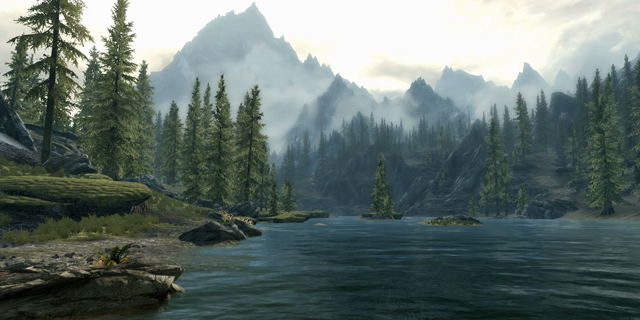
Narration is not something you often see in games. For fans of film, narration as a means of exposition is something that is not unheard of. In games, especially outside of cutscenes or story moments, is not something that is often explored. At least I thought it wasn’t, until I played this year’s indie darling, Bastion, and discovered my love for narration all over again. Of course, Bastion is a much smaller game that doesn’t leave as much open in terms of exploration or choice. It made me wonder, could Bastion-style narration work in an open-world game?
Imagine you’re playing Skyrim and you walk into a situation where you can choose to help a group of prisoners escape from the Imperials. These prisoners appear to be members of the Stormcloaks, a rebel group in the land of Skyrim, and helping these people would surely help gain favor with them. Before you do anything, a voice is heard, almost as if someone had been watching the entire time. The voice speaks about the choice that is laid in front of you, and briefly mentions your previous run-in with the Imperials. You killed some of their men, whether it was by accident or on purpose, and any further actions against them would surely mean your chances to join them in the future were slim to none, something you may have completely forgotten about by this point in time.
You make your choice, and the voice congratulates you; whatever you decided to do, you feel rewarded. This disembodied stalker is there to offer a neutral point of view, but it still allows you to feel just in your actions. Later on, you may be reminded again of your choice by your new friend, allowing you to reap the benefits of it or see the eventual negative impact of what you did. Most of this might have come across without the voice, but perhaps with it you feel as if your actions had a greater purpose.
The downside to this? It’s hard to strike a balance. When does enough become too much? The narrator might begin to get on your nerves, stating the obvious or becoming nothing more than a glorified tutorial. A narrator, like the one in Bastion, can help out the player in meaningful ways without it seeming forced, but in a game as big as Skyrim, there are only so many possibilities. To create a character like the narrator in Bastion for a game like Skyrim would take much more effort, and if it isn’t done right it would just feel rushed or unessential to the experience.
Of course, you could make the argument that a narrator for a game like Skyrim is unessential to the experience. You are rewarded for your actions in one way or another; the conversations you hear around towns or the way NPCs react to you might be enough to give you an idea of how people feel about what you have been doing. A narrator at that point might be stating the obvious or even ruining moments that the game may have already laid out for you. In-game narration is tricky, and it’s hard to say just how well it could work in larger games.

Bastion was built around its narrator, or at least had the narrator as part of its key focus. There was never a line he said that felt out of place or seemed annoying in any way, at least not in my mind. To create a game around the idea of a narrator is something that requires a lot of effort and it’s something that a lot of developers might see as essentially pointless. I see it as a beneficial effort though, especially for those who wish to create a world and make it see believable in a short period of time.
Even if Bastion was never fully fleshed-out in terms of characters or story, it felt like I had gone through the history of this place in a matter of hours. The backstory was weaved together into the gameplay in such a natural way and you were always learning something new, even if you never realized at first. Developers that want to create these worlds but are working on a much smaller canvas can still do so; they just have to find ways to work around their limitations.
Maybe Skyrim couldn’t benefit from it; the game itself is large enough to pull you in without having your own personal historian on your shoulder. You always feel engaged with a quest or mere dialogue with an NPC and you can learn so much just from listening to random conversations happening in towns or cities. But not every game can be Skyrim. Not every experience should be either, but that doesn’t mean there shouldn’t be a world there worth exploring, even if the exploration is limited by the technology or the budget.
I’m not saying every game should follow Bastion’s formula to the letter, but it’s a concept that should not go unexplored in this industry. Narration can both be a tool to create meaningful experience and also a tool to destroy them. If done poorly, narration can ruin an experience by boring the player or hitting over the head with too much exposition. If done right, you might be able to create a world as large and explorable as Skyrim in an experience that only lasts six hours.



















